This page contains affiliate links. Please read our disclosure for more info.
A few weeks ago we wrote our reflections on 2000 days as digital nomads, looking back at the highs and lows of life on the road, living out of a backpack and working online. In today’s post we answer your questions about our lifestyle.
How do you afford to travel?
We’re digital nomads which means we work online so we can work from anywhere as long as we have access to the internet. When we first started Simon did freelance web design but after a few years he taught himself to make iOS apps. He no longer does client work and instead focuses on his own projects. I work on this travel blog which earns an income from advertising, sponsorships, and affiliate commissions. I’ve also done a few freelance writing assignments.
Read more about how we fund our travels.
What’s your favourite country?
We don’t have one favourite country and this question gets more difficult to answer the more we travel.
We love Italy for its food and beauty; Japan for its quirkiness, efficiency, and wonderfully polite people; and India for its nonstop craziness, vibrant life, and vegetarian friendliness.
We often return to Thailand (especially Chiang Mai and Koh Lanta) as it’s a great digital nomad destination (low cost of living, apartments to rent, good WiFi) with delicious food, beautiful temples, mountains and beaches, and friendly people.
There are countries we’ve really enjoyed travelling to and highly recommend to others like Slovenia, Jordan, and Cuba, but that we haven’t spent much time in so its hard to call them favourites.
We love to visit the US—especially Portland, San Francisco (and all of California), and Disney World.
It really is impossible to choose a favourite as everywhere has something different to offer.
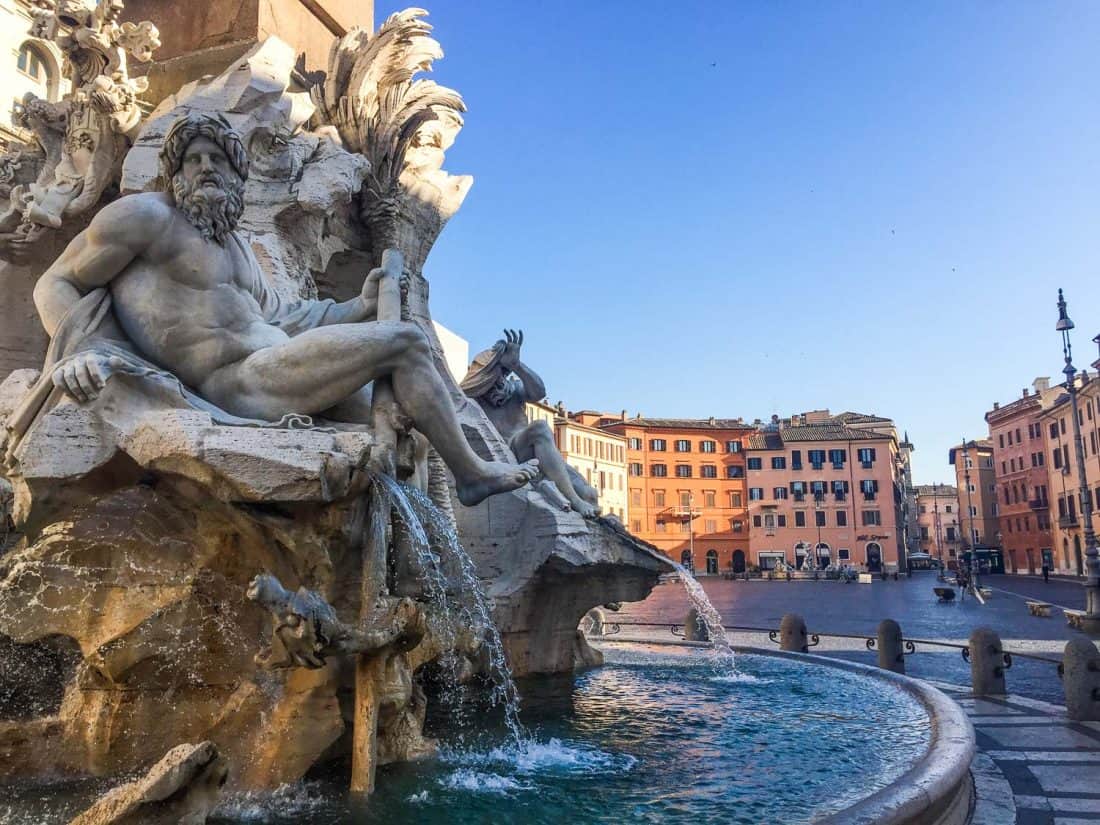
How do you choose where to go next?
Many factors: weather (we follow the sun), the need for change (we tend to divide each year between Europe and Asia or Latin America), a craving for certain foods, weddings and other family events, the availability of apartment rentals/WiFi/vegetarian food.
We usually only fly long haul twice a year so we stay a while on continents and visit countries that are close by. We have a long wish list of places to visit so we see where is pulling us most strongly.
Do you get tired of moving around? How do you balance work and travel?
We definitely get tired of moving around sometimes so we tend to travel slowly spending at least a week or sometimes a month in one place, with a couple of 2-3 month stints in one place each year. Slow travel is essential for balancing work and travel—if we stay somewhere for longer periods of time we have time for work and exploration, and can get into routines that help our productivity.
I’ve written more about this issue in our reflections on 2000 days as digital nomads.
How do you manage your relationship as a couple and as business partners? How do you decide who does which tasks? Do you ever need time apart?
We’ve been together for 16 years (since we were 18) and have always been a very close couple who spend a lot of time together. Long term travel is probably the ultimate test for relationships as you are together 24/7, often in stressful situations (Till the Money Runs Out have a great article on why couples should travel before marriage), but we’ve found we thrive on it and get on even better than we did before we travelled, probably because we’re happier.
We don’t feel the need to spend time apart but we do naturally do some things separately—in the last few years I’ve started running and yoga which I can’t quite convince Simon to join me in, and when we’re working we’re usually in separate areas, even if it’s in the same room.
Our roles have emerged naturally based on our skills and interests—Simon does anything technical or design related (including creating apps, designing the blog, and general computer/website maintenance); I do most of the writing and photography on the blog, and all the travel planning; I cook, Simon washes up.
We used to argue about business decisions but I think that came from fear and from feeling we should do things that we really didn’t want to do. Since we accepted that we’re not motivated by money and only want to work on things we enjoy (read more about how we found our own path) it hasn’t been a problem.
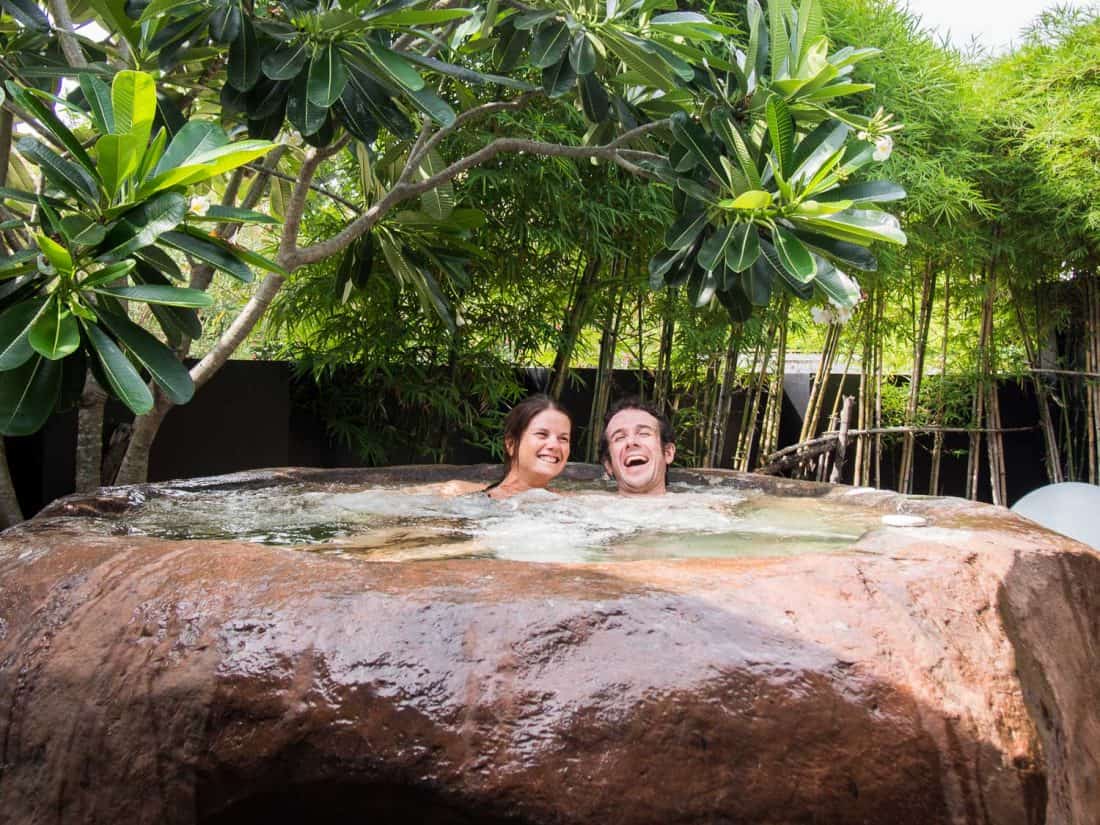
Do you get lonely? Do you meet other expats on the road?
We don’t get lonely because we have each other. Through our blog we’ve made lots of friends with other nomads and often cross paths with them around the world, especially in digital nomad hotspots like Chiang Mai. When we stay in one place for a few months we sometimes get to know expats who are living there, but we’re more likely to meet up with other nomads and bloggers.
If you are a solo traveller you are likely to meet a lot more people than we do as we tend to be pretty self contained. There are always opportunities to meet people including staying in hostels, co-working spaces, Facebook groups, and couchsurfing meetups.
Do you miss home and how often do you go back?
After over five years away we don’t consider England home anymore and have no desire to live there again. We go back about once a year in the summer (which is the coldest weather we experience all year!) to see friends and family and take care of practical things like visits to our doctor and dentist. We usually coincide our visits with events like weddings and major birthdays. We haven’t spent Christmas with family since we left, and it is something we’re considering as we do miss family at that time (and it never feels Christmassy in the tropics!), but England in December isn’t very appealing!
We find that although we see our family less often than before we spend longer periods of time with them, and we’ve also enjoyed people coming out and visiting us.
If you are considering nomadic life but are worried about missing home then remember that you get to set the rules—you can go back as often and for as long as you like. That’s the beauty and freedom of this lifestyle.
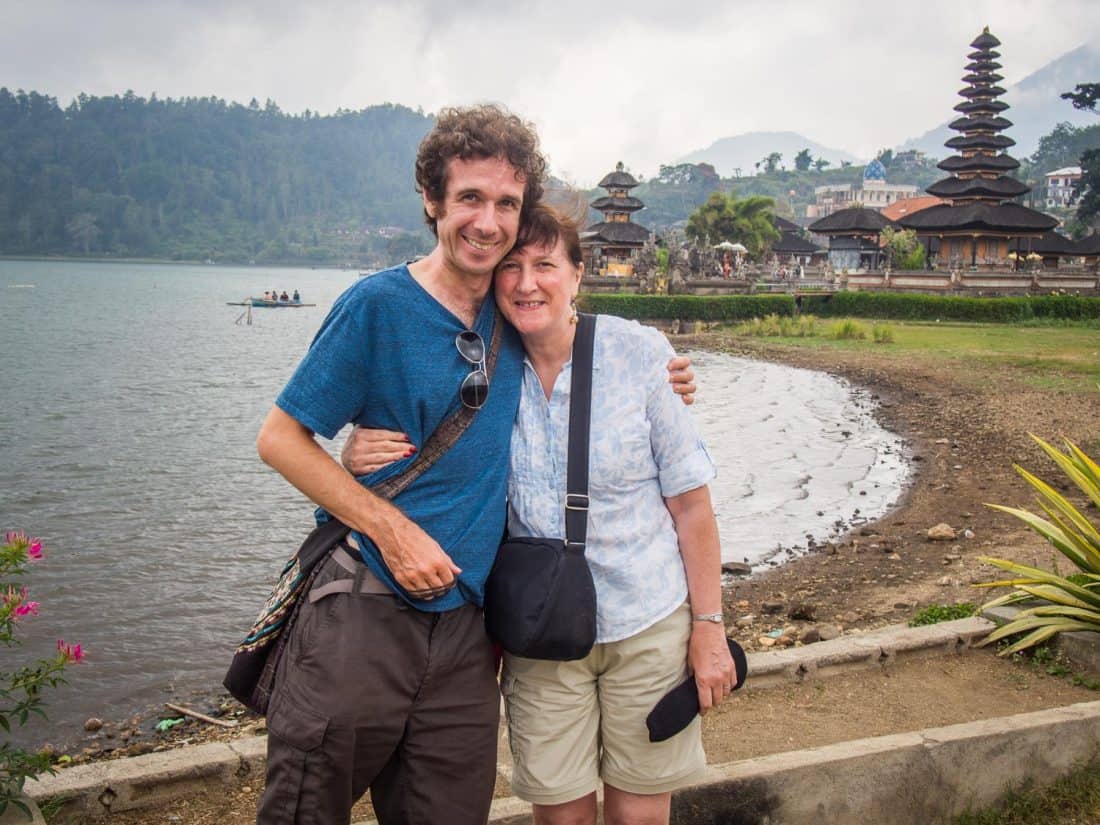
Do you plan to have kids and would you travel with them?
We aren’t going to have kids but plenty of families travel long term together.
How do you track your expenses and manage your finances abroad?
Ever since we starting saving for travel we’ve kept track of every penny we’ve spent—first using spreadsheets and for the last three years using Trail Wallet, an iOS app that Simon created to help us and other travellers stay on budget. It makes tracking your expenses really easy and does all the currency conversions for you.
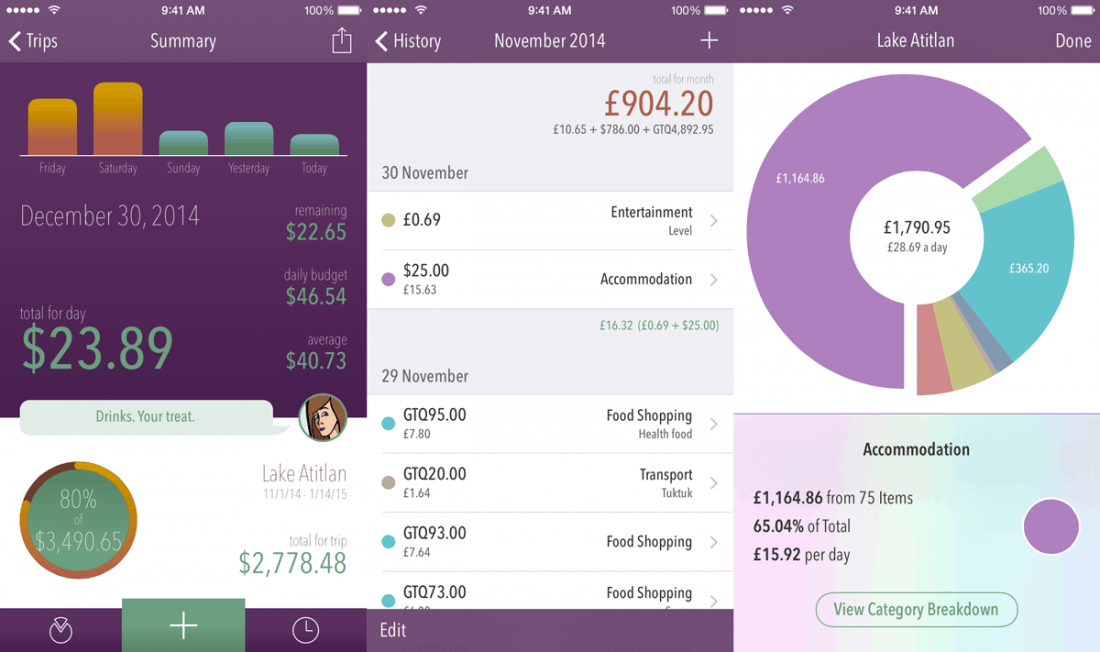
We manage our bank accounts using online banking, and withdraw cash from ATMs when we arrive in new countries. We carry multiple credit and debit cards in case anything goes wrong with one, and we always have an emergency supply of US dollars. You can read more about how we manage our finances.
Do you think it’s a good idea to consider becoming a digital nomad before you actually have sufficient clients?
In an ideal world you’d have an established business before you left but we didn’t (Simon had one freelance project from his previous employer). We saved up enough to keep us going for about a year in South America while we grew our business (we didn’t end up needing most of the savings but it’s good to have as our income varies), and we’d definitely recommend having savings.
Set yourself a deadline to leave and in that time save up and try to gain clients or grow your business, but then go anyway. There’s never a right time, and in many parts of the world you can live inexpensively while you work on your business.
What do you do about healthcare and travel insurance?
We use True Traveller for travel insurance as they are one of the few insurance companies that lets you purchase a new policy when you are already abroad and without a ticket home. They are a great option if you are from the UK or EU, and for everyone else we recommend SafetyWing who we’ve used in the past—they are more expensive but very reliable and used by many digital nomads. We’ve written a more detailed post about travel insurance.
We have typhoid, diptheria, tetanus, Hepatitis A, and Hepatitis B vaccinations which we get boosters of when needed in the UK or in places like Chiang Mai where we have a doctor we trust. We also got yellow fever before we visited South America. We don’t take malaria medication as most places we visit are low risk—we use the Fit for Travel NHS website to decide.
We’ve been lucky not to be seriously ill on our travels and have only been to doctors in Thailand for minor issues and for rabies vaccinations (after Simon was scratched by a monkey and I had a minor bite from a dog, on separate incidents!). We found the healthcare good and prices low.
Of course, we are not doctors so you should always seek proper medical advice before travelling.
How do you manage to refrain from collecting souvenirs along the way? With carry-on luggage only you wouldn’t have space for memorabilia or precious possessions.
We don’t buy souvenirs at all. In the process of saving for travel we lost our interest in shopping so we’re never tempted. Our memories and photos of our experiences are more important to us than any physical souvenir.
If you do love to shop but are travelling light then you could focus on small and wearable things like jewellery, scarves, and clothes. You could also post items home.
How on earth do you travel with just a carry-on backpack?
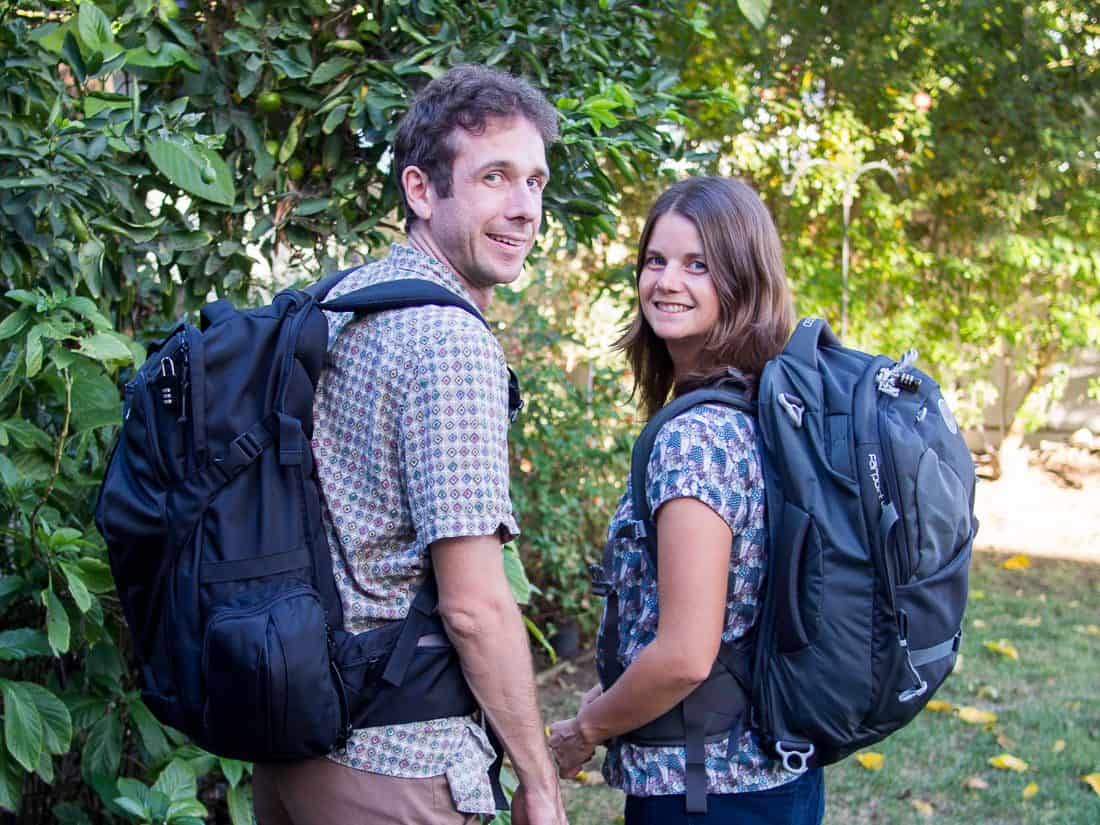
By prioritising. We only travel with things we use regularly—everything has to earn its place and we never pack things “just in case”. We bought carry-on sized backpacks (Simon has the Tortuga Outbreaker, I have the Osprey Farpoint 40) so we had no choice but to only pack what could fit inside, and we use packing cubes to maximise space. We can mix and match all our clothes, a kindle saves on book weight, and we’ve minimised our toiletries.
It might seem difficult at first but you really do get used to it—even if we had more clothes I’m sure we’d just wear the same things. Travelling light makes life so much easier that we can’t imagine travelling with more.
I wrote a book about how to travel carry-on only, whether you are travelling for a week or a year, and you can also see our packing list, our tips on travelling with just a carry on, and our review of our carry-on backpacks.
Do you have any regrets? And if you could have done anything differently, what would it be?
Simon wishes he had started making apps sooner as we had the idea for Trail Wallet two years before he actually built it. We would be much further along if we had created it then. Still, of all the regrets to have, it’s a minor one and the lesson was follow your muse first and worry about money second.
Our only travel regret is not going to the Galapagos Islands while we were in South America. We were worried about the cost but it would have been fine. There’s a theme emerging here…
Do you plan to settle down? If you had to choose a place to live where would it be?
We can’t imagine settling down as we love the freedom of this lifestyle too much. There are plenty of places we’d be happy to return to regularly—Chiang Mai and Koh Lanta in Thailand, Ubud in Bali, San Francisco and Portland in the US, and anywhere in Italy—but we wouldn’t want to live in any of them year round. We like to mix up city, country and beach life; tropical winters and European summers; and choosing just one place to live feels too restrictive.
You can also read our posts about the practicalities of life as digital nomads. Part 1 covers health, banking, and retirement, and Part 2 discusses tax, visas, internet, phones, one way flights, and security.
Thanks to everyone who submitted questions on Facebook and by email!
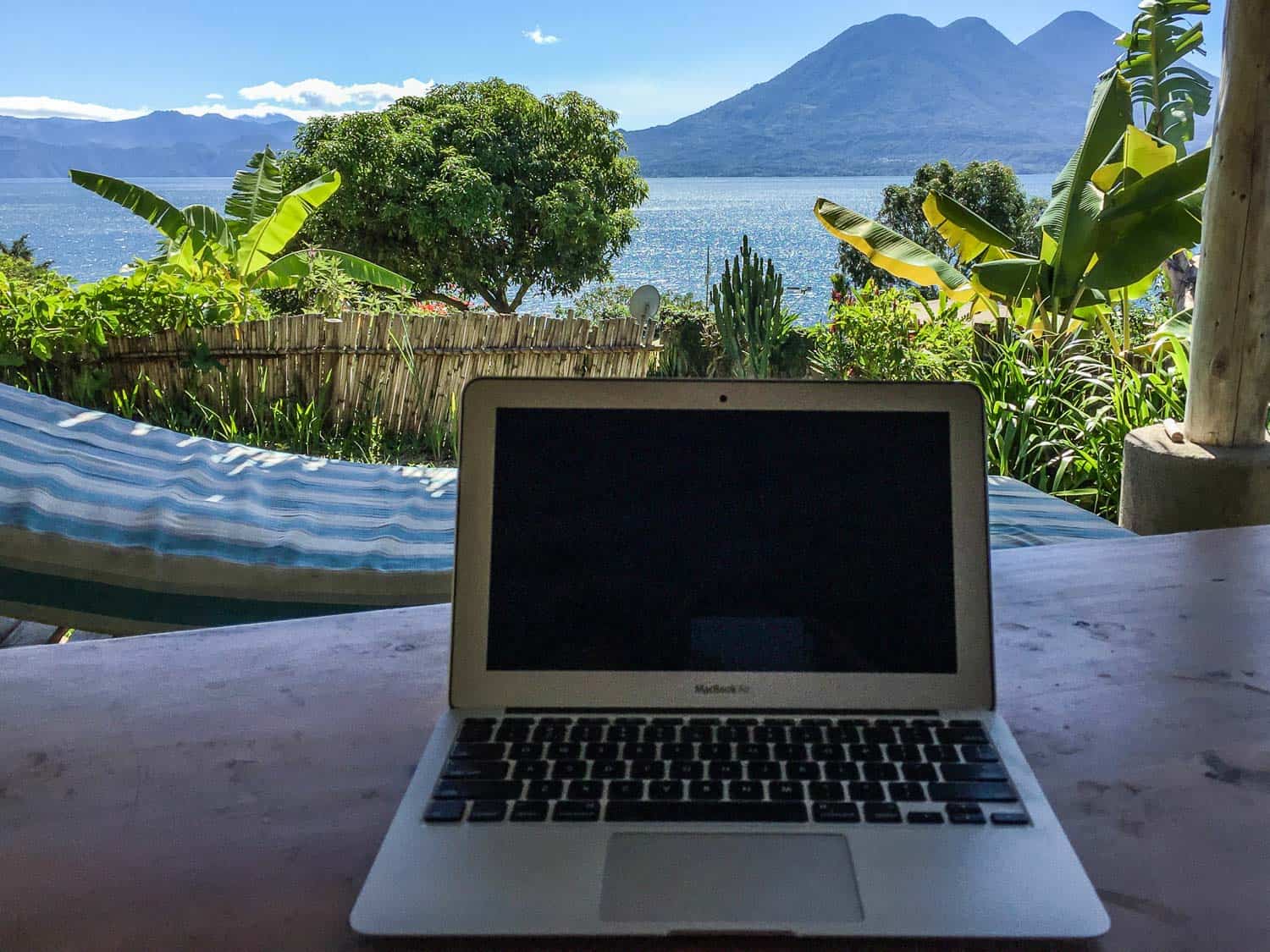
Thanks again for another great post full of great info, even though it feels like a nice concise summary. And i actually get even more sometimes from all the questions in the comments as well. :) Cheers guys,
-PJ
Excellent post !!! i really admire the kind of life you have is hard but it worht it
It made me smile to spy Portland on your list of places you’d return to regularly ;)
We really loved Portland! Although we had amazing weather when we were there last September so I’m not sure how we’d get on in the winter.
Winter in Portland is not bad. Very mild with some rain. I think you would be fine. It is a great foodie city with excellent pubic transportation. Love the place.
I love that you state you love Italy first for its food. That is why I want to visit Italy. And oh yeah, they have some historical sites too. But Pasta, Pizza and Wine, Mmmmm. Yum
Thanks for the follow-up.. our biggest question is how you earn income from the ads/ affiliate marketing because we note many travelers do have this as one of their many means of income but are a bit confused by it all and unsure where to get started. I don’t think you’ve covered that bit before but can you refresh the link in my mind if you have?
Affiliate marketing is making a commission on products we recommend. Amazon is an easy place to start or you can google “affiliate programme” + the name of a product/service you like to use and see if they run one. Then just write about whatever it is. You do need quite a lot of traffic to make a good amount of money from this though – it took us 5 years for it to be a significant part of our income.
We haven’t done anything active to find advertisers – they tend to find you once your site gets big enough.
Thanks Erin.. I guess my question on the advertisers was because your site always seems blessedly ad-free! You see some blogs and the entire home page is covered with ads and pop-ups but that isn’t the case with yours. So, my question is do you only randomly offer ads? Put them at the end of a post as opposed to your home page?
We are really careful about the ads we show. We used to have some in our sidebar but have moved away from that for now. We’ve worked with companies like Trover who have sponsored our posts about them, but we only do this for companies we love. We’ve also had text ads at the bottom of posts and hosted guest posts that don’t appear on our homepage.
Very informative post for those interested in this lifestyle … with hard work and a value oriented mindset, those reading this can make it happen for themselves!
Thanks Will. We do believe this life is possible for most people who want it enough.
Hey great insights. It is good to get a breakdown of the way different nomads are working around the various factors we need to deal with. Sometime we find ourselves saying this world is just not setup for nomads, seems to be evolving though. Thanks for the post, will follow along.
The world really isn’t set up for nomads—an address is needed for so many things. There are lots of tools that make life easier for us now though.
It’s so great to hear that somebody who is a digital nomad and travels for years also uses only carry-on backpack. I’ve been only to a few backpack trips around Asia and Europe, but after I switched from Check-in Luggage to Carry-on I would never go back. I’m so glad you’re writing a book about it, so hopefully a lot more people would realize its benefits and start traveling light.
Nice to hear from anther carry-on traveller!
A very nice write-up and the most common questions any one who wants to travel that often comes up, myself and my wife love travelling and want to get into a similar setup and we are gearing towards that until we get some immediate stuff sorted.
Thanks for the tips and info.
I have a question but I hope you won’t take it too badly. I’m not feeling aggressive while asking, just to be clear :)
So, my husband and I have experienced the digital nomad living for a year, and read many of your articles to choose destinations (thanks, that helped a lot!). That was a great experience but we have decided to stop, because we couldn’t stand boarding on a plane anymore. We were worried about the thousand and thousand of litres of fuel that were burnt to take us to the other side of the planet. A little bit as if we would have to explain one day to our kids that they can’t take the plane anymore because our generation wanted to live in the tropics and eat a burger in the US at the same time. We are thinking of starting again a digital nomad life, but with trains and maybe bicycles… that would be fun and more “responsible”. Have you thought about this idea too? Do you feel bad sometimes about your plane trips? I know you are both vegetarians, which is already such a good thing for the planet (we are too!). I was just wondering if that was something that was in your minds sometimes.
Hi Charlotte
It is something we have thought about but I don’t think there’s a simple answer and we wouldn’t stop travelling because of it. We try to limit our flights—we love train travel in Europe and don’t switch continents too often. We also think that we live in a more environmentally friendly manner overall by travelling—we no longer have a car, we don’t commute to work, we don’t buy much stuff, and (unlike in England) we can buy local, often organic produce easily.
Flying isn’t necessarily the worse thing you can do for the environment. This article shows that in the US cars cause more carbon emissions than planes, trains, ships, and trucks combined: http://waitbutwhy.com/2015/06/how-tesla-will-change-your-life.html
Another consideration is that if we all stopped flying then what would be the impact on places (like Bali where we are now) that are so dependent on tourism? We feel we make a positive impact by increasing income for people in developing countries.
There are plenty of travellers who travel overland and by bike. In all honesty, we’re not prepared to make that sacrifice but if you are then go for it!
I think you’re spot on, Erin. We don’t have to live a life of penance just because we’re enjoying the fruits of living in a developed world.
My wife and I are conscious of our impact (a part of why we’re vegan), but everyone still has to live our lives. It’s too easy to take that carbon footprint mindset to an extreme and not do anything…but I think that hurts the world more than it helps. There’s always carbon offsetting (www.coolearth.org is a great one).
We love mixing up the modes of transportation with bikes, van, train and plane! I just spent a few days in Glacier during a Montana van road trip and the experience of being able to stay comfortably in the park (while carrying our favorite toys) without just cruising through in a car is great. Variety is fun.
It’s all about what makes you happy, and I admire that you two do what works best for you. Keep on keeping on!